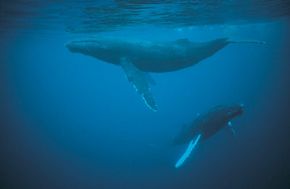Quck answer
Yes, whales and dolphins do sleep, but not in the same way that humans do. They have to consciously come to the surface to breathe, so they cannot fall into a deep, unconscious sleep like humans can. Instead, they have a form of sleep called unihemispheric slow-wave sleep, where only one hemisphere of their brain sleeps at a time while the other remains active to control breathing and remain aware of their surroundings. This allows them to rest while still being able to swim, surface for air, and avoid predators.
Wild Animals

Whales and dolphins are both mammals like humans, but they have unique characteristics due to their environment. Their respiratory system allows them to stay underwater for long periods of time, which means they must be conscious breathers and actively decide when to breathe. This poses a problem for their need for unconsciousness to function correctly.
The solution for these conscious breathers is to let one half of their brain sleep at a time. This allows them to never be completely unconscious and still get the rest they need. Scientists have studied this phenomenon in dolphins and found that half of their brain does indeed “shut down” while the other half remains active during the sleep cycle. Dolphins are in this state for around eight hours a day.
Although we can’t know what this rest state feels like, it is most likely similar to the semi-conscious state humans experience as they begin to fall asleep. Whales and dolphins could sleep anywhere, but they tend to sleep near the surface of the ocean so they can easily come up for air. Dolphins can often be seen “logging,” swimming slowly along the surface, with very little movement which is likely a sign of rest.
If you want to learn more about marine animals, check out Jeff Corwin’s shows on Animal Planet or visit the links to WhaleNet, World Wide Whale, and Marine Mammal Net.
Lots More Information
Related HowStuffWorks Articles
- How Sharks Work
- How Whales Work
- How the Georgia Aquarium Works
- How Sleep Works
- How Jellyfish Work
- How Squid Work
- How do fish rise and sink in the water?
More Great Links
- WhaleNet
- World Wide Whale
- Marine Mammal Net
FAQ
1. Do whales and dolphins sleep?
Yes, whales and dolphins do sleep, but their sleep is quite different from that of humans. Instead of sleeping for hours at a time, they sleep in short intervals, usually only a few minutes at a time. This type of sleep is called unihemispheric slow-wave sleep, which means that only one hemisphere of their brain is asleep at a time, while the other remains active to help them breathe and stay alert to potential dangers.
2. How do whales and dolphins sleep?
When whales and dolphins sleep, they shut down only one half of their brain at a time, and the other half remains active. They also swim slowly and close to the surface of the water, which allows them to breathe easily. During their sleep, they usually swim in a group, and one whale or dolphin will keep watch while the others sleep. When it’s time to switch sides, the awake whale or dolphin will nudge the sleeping one to wake it up and take its turn sleeping.
3. Why do whales and dolphins sleep in short intervals?
Whales and dolphins sleep in short intervals because they are conscious breathers, which means they have to be awake to breathe. If they were to sleep for extended periods of time, they would suffocate and die. Short intervals of sleep allow them to rest while still being able to come up for air and stay alert to potential dangers.
4. How much sleep do whales and dolphins need?
It’s unclear exactly how much sleep whales and dolphins need, but it’s believed that they sleep for several hours each day in short intervals. The amount of sleep they need may vary depending on their age, species, and environment.
5. Can whales and dolphins sleep while swimming?
Yes, whales and dolphins can sleep while swimming, thanks to their unihemispheric slow-wave sleep. They are able to shut down one half of their brain at a time, which allows them to rest while still being able to swim and breathe. However, they usually only sleep while swimming slowly and close to the surface of the water to make it easier to breathe.
6. Do whales and dolphins dream?
It’s unknown if whales and dolphins dream, but it’s possible. Sleep studies have shown that their brain activity during sleep is similar to that of humans, including the presence of rapid eye movement (REM) sleep, which is associated with dreaming. However, since we can’t ask them about their dreams, we can’t know for sure if they experience them.





Leave a Reply